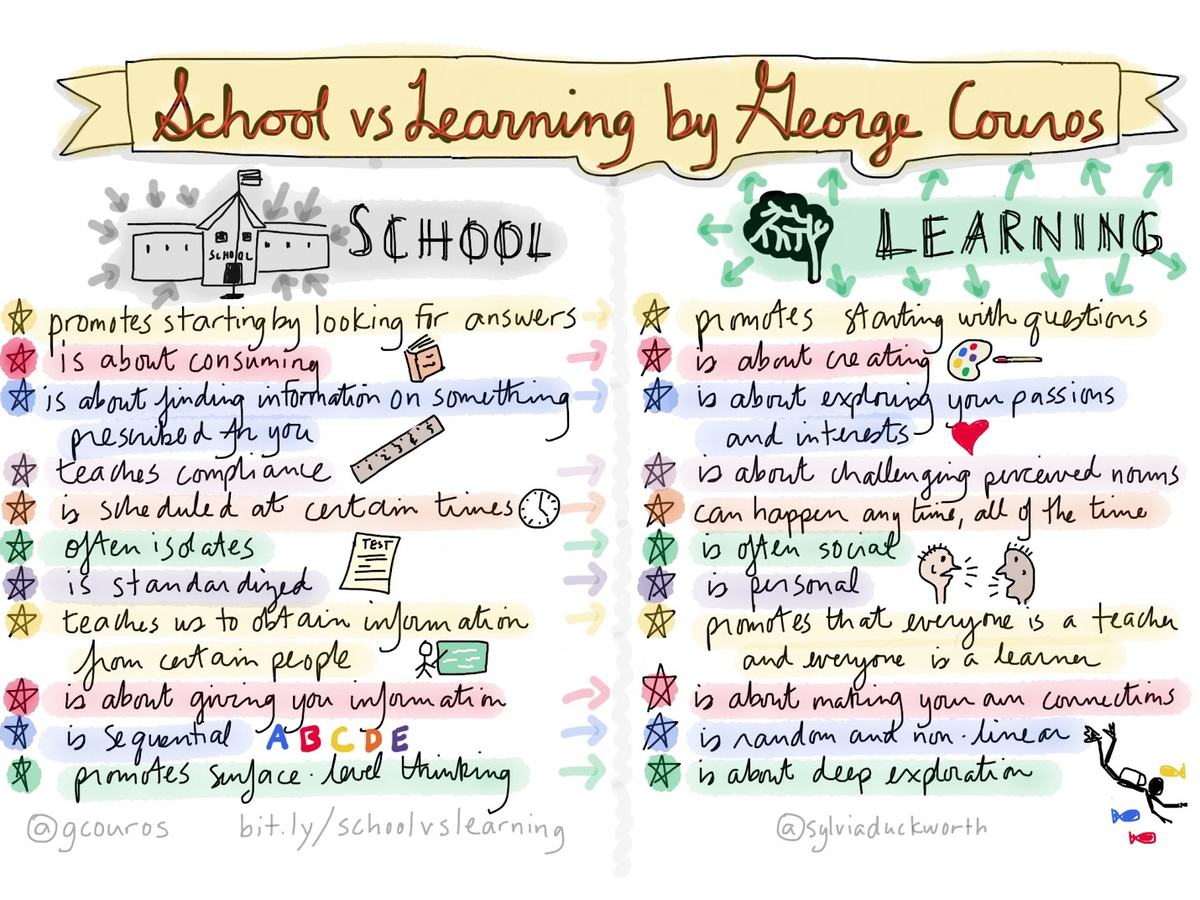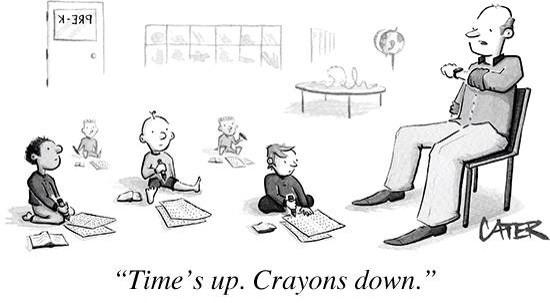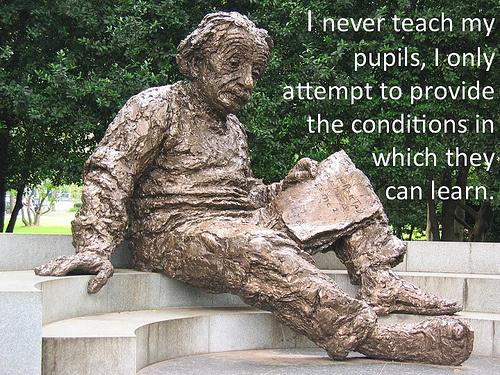For quite some time now I have contemplated what school could look like if we weren’t so ‘programmed’ as to what school is. Let’s face it, school start and finish times are generally dictated by bus timetables, especially in rural and regional settings. A majority of classrooms appear similar to what they were 30 years ago, and governments regulate the focus of ‘learning’ through mandated curriculum and mandated hours. The public indicators of success for schools are NAPLAN, end of school examinations and ATARs. Hhhhmmmm. In contemplating what school could look like, one must consider what learning IS. On Sunday 25 January, 2015, via Twitter @ijukes posted a George Couros’ graphic.  Source: School vs. Learning by George Couros.
Source: School vs. Learning by George Couros.
Ian Jukes also posted a link via Matt Armstrong. The link led me to an article called “The Future is Learning, But What About Schooling?” by Richard F Elmore dated 5 January, 2015. The article clearly contexualises learning in 2015 and is also critical of current day schooling. Elmore writes,
Schools, as we currently know them, will continue to exist, if only because the byzantine collection of political interests that underlie them will keep them afloat regardless of their contribution to learning. AND….. learning has largely escaped the boundaries of institutionalized schooling.
 https://pbs.twimg.com/media/B8KUmcQIUAASMmb.jpg:large
https://pbs.twimg.com/media/B8KUmcQIUAASMmb.jpg:large
Such images support Elmore’s arguments that…….
Standards and expectations have become more and more literal and highly prescriptive in an age where human beings will be exercising more and more choice over what and how they will learn. Testing and assessment practices have become more and more conventional and narrow as the range of competencies required to negotiate digital culture has become more complex and highly variegated. The type of knowledge and skill required to negotiate this increasingly complex world is completely different from what schools have conventionally done, and schools are institutionally disadvantaged as players in this new world, in large part because of the well-intentioned efforts of school reformers.
Elmore’s comments about schooling contrasts with what he sees learning to be……
an individual and social activity, has never been so alive as the present, and it will continue to grow in scope and breadth indefinitely.
Of course, the contrasts between ‘schooling’ and ‘learning’ provide great challenges for principals and teachers. Elmore talks of teachers and writes, “Teacher preparation, hiring, induction, and evaluation practices have become more and more rigid and hierarchical in an age where the teaching function is migrating out into a more individualized and tailored set of learning environments.” We need to empower teachers to provide the conditions for ‘learning’ and not just adhere to the constraints of ‘schooling’ as dictated by other influences.

Thanks for the post Greg. Both you and Cam Paterson (@cpaterso) have clearly been affected by Elmore’s work and it does line up with my own philosophies, hopes and fears about school and learning. Whilst schools do more than just shovel a curriculum into the minds of students (to extreme degrees of success) and the very best do provide a rich life experience for the students in their care, I do wonder at which point students will – en masse – wake up to the fact that learning does not only happen within the school walls. It’s like believing that all knowledge is housed in libraries. It USED to be true – during the times when all our current structures, institutions, unions, frameworks and patterns of thinking were being built – but is now no longer true. Libraries still serve a critical function in democratic and civil society and one much more than just a secure place for dead trees with ink on them. What function do schools serve and are they adapting fast enough to the needs and expectations of the economy and society? At what point will students – and teachers and parents – rebel against the bells and standards and structures that are built to feed themselves rather than feed good learning?
Schools most certainly need students. When will students stop needing schools?
Thank you for sharing your reflections Greg. Your closing comments resonate with me. We must continue to strive to recognise leaders as learners and allow leaders to be recognised as such. It is about learning, for everyone, at all times. This means that one of the key roles of adult learners, is to create a space conducive to learning for all, while at the same time, acknowledging that it is not the only place where learning will occur. Realising this to its full potential will be evidenced in learners being able to transition through different stages of the learning journey with support structures in place to enable the learner to develop skills to self-direct, self-reflect and collaborate and engage with other learners.
Great article Greg. Schools should be built around learning – not based on the industrial model most of ours are built on today. Timetables, periods, bells, set learning times, restrictions on devices, sequential age based groupings, current assessments (both internal and external) – all need to change. Who will be brave enough to move this forward? Learning should be based on the individual – and his or her own needs. The teacher wold still have a significant role to play – not so much as a person at the front of the class – but as a co- learner and facilitator.